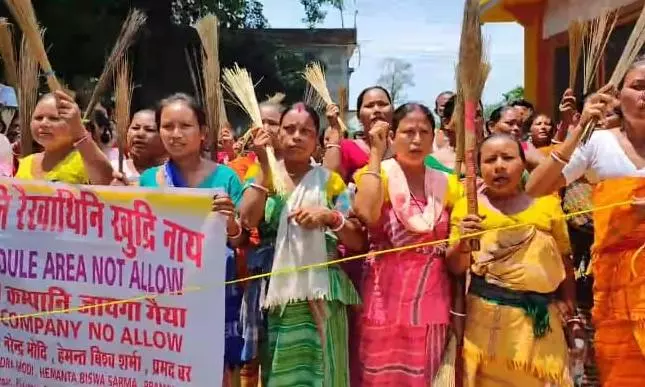Umrangso on Edge: The Indigenous Peoples Party (IPP) has accused the North Cachar Hills Autonomous Council of illegally handing over 9,000 bighas of ancestral land for a cement plant project—displacing over 14,000 tribal families
BY PC Bureau
June 21, 2025–Protests are intensifying across Assam’s tribal regions against a growing number of land deals involving the Adani Group. Tribal councils, indigenous parties, and grassroots organizations are accusing state authorities of bypassing constitutional safeguards to facilitate corporate access to ancestral lands, particularly in Sixth Schedule areas.
The latest flashpoint is Umrangso, where the Indigenous Peoples Party (IPP) has demanded that the North Cachar Hills Autonomous Council (NCHAC) cancel a land agreement with Adani for a proposed cement plant. The IPP alleges that over 9,000 bighas of tribal land have been handed over illegally, threatening to displace more than 14,000 families from Karbi, Dimasa, Naga, and Adivasi communities.
“This is not development. This is dispossession disguised as investment,” said Rajen Timung, IPP’s chief convenor. Talking to media persons He called on NCHAC Chief Executive Member Debolal Gorlosa to revoke the deal and apologize publicly to the National Commission for Scheduled Tribes (NCST), which has already issued a notice seeking an Action Taken Report (ATR).
READ: Anti-Trump Rage Sweeps America After US Strikes Iran
Land-for-Profit: A Pattern Across Regions
Similar resistance has been building in West Karbi Anglong, where community leaders allege that thousands of bighas were allocated to Greenko and Adani without proper consultation. The Karbi Students’ Association (KSA) and Karbi Human Rights Watch (KHRW) have staged rallies and sit-ins, accusing the Karbi Anglong Autonomous Council (KAAC) of acting as a “rubber stamp” to state cabinet decisions.
NEWS | National Commission for ST has issued a notice to #DimaHasao DC, demanding an Action Taken Report within 7 days regarding the alleged illegal allotment of 9,000 bighas of tribal land in #Umrangso for #Adani‘s mega cement plant project.
Read: https://t.co/hZud54oggV… pic.twitter.com/nJLrgLAxH7
— GPlus (@guwahatiplus) June 18, 2025
In Kokrajhar, the All Bodo Students Union (ABSU) and several BTC-based civil society groups have raised alarm over secretive land deals involving Adani Green Energy for solar parks. A memorandum submitted last week to the Bodoland Territorial Council (BTC) warned of “land alienation under the guise of sustainability.”
“The Assam government is treating tribal land as a currency to attract private capital. This is neo-colonialism in the name of green energy,” said Ranjit Basumatary, a social activist in BTC.
Tribal Autonomy Undermined
Activists and constitutional experts argue that these land transfers violate the Sixth Schedule of the Indian Constitution, which gives Autonomous Councils legal control over land, resources, and governance. “The state cabinet has no authority to override council ownership of land. These deals are unconstitutional,” said former law professor Dr. Irongbam Subhachandra, now an advisor to several indigenous organizations.
READ: Honeymoon Horror: Meghalaya SIT Arrests Two More from Indore
The IPP claims the state is using tribal land as collateral to secure loans from the World Bank and other global financial institutions. “Why can’t these councils negotiate directly with investors? Why must the state act as a broker?” Timung asked.
Selective Silence and Political Complicity
Activists have also criticized the silence of mainstream political parties. The Kuki Inpi, Naga Mothers’ Association, and KOHUR (a joint tribal coordination platform) issued a joint statement condemning the commodification of indigenous land. “We are not against development. We are against theft in the name of progress,” the statement read.
Particular criticism has been directed at Assam Cabinet Minister Nandita Gorlosa, who has supported the Umrangso deal despite being from the region. “If you can’t protect tribal rights, you have no moral right to hold office,” said Timung.
Resistance is Growing – And Getting Results
Earlier this month, the IPP successfully halted an ADB-backed solar project in Karbi Anglong after exposing procedural violations. Similarly, several land hearings in BTC and KAAC have been postponed due to mounting pressure.
The IPP says it welcomes development “that respects council ownership and tribal consent”, citing its recent MoU with Numaligarh Refinery Ltd (NRL) as a model. That project ensures land retention, 70 job opportunities, and 42% profit sharing for the local council.
As discontent simmers across tribal belts, the credibility of autonomous institutions stands at a crossroads. “If councils meant to protect our rights become mere agents for corporate interests, the very idea of autonomy is in peril,” said Manashi Terang, a rights activist.
With more groups mobilizing and constitutional violations being flagged by the NCST, the controversy surrounding Adani’s footprint in Northeast India is poised to become a defining political and legal battle over land, law, and tribal identity.














